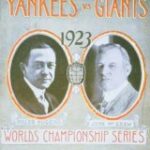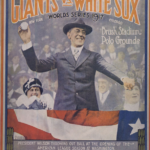History of the World Series – 1988
After closing the regular season with a record-breaking 59 consecutive scoreless innings and then racking up one victory and a save in four National League Championship Series appearances, the Dodgers’ Hershiser was the recipient of a well-deserved rest when the World Series got under way at Dodger Stadium on the night of October 15. With his ace watching the proceedings, Los Angeles Manager Tom Lasorda called upon rookie Tim Belcher to go against Dave Stewart, who had won 21 games for Oakland in the Athletics’ romp to the American League pennant.
Belcher, obtained from the Athletics in September 1987, knew his old teammates packed a lethal punch. After all, Oakland, paced by the power-hitting duo of Jose Canseco and Mark McGwire (a combined 74 home runs in the regular season with 223 runs batted in), had strong-armed its way to a 13-game margin of victory in the American League West race before dispatching the Boston Red Sox in four straight games in the AL playoffs.
The key for Belcher was to keep men off base — that, or show an ability to handle Oakland’s bashers. He did neither. The Los Angeles righthander loaded the bases in the first inning but wriggled free. In the second inning, working on a 2-0 lead, he wasn’t so lucky. A single and two walks (one issued to the opposing pitcher) again filled the bases. Belcher struck out Dave Henderson for the second out of the inning, but Canseco proceeded to cannonade a 1-0 pitch over the center-field fence. It was the 15th grand slam in Series history.
Los Angeles’ bullpen took over in the third inning and held Oakland at bay the rest of the way. The Dodgers, meanwhile, closed within 4-3 with a sixth-inning run but appeared doomed when, still trailing by one run, they found themselves down to their last out in the ninth with no one on base. With A’s relief standout Dennis Eckersley (45 saves in ’88) having replaced Stewart at the outset of the final inning, things seemed particularly bleak for the National League champions.
Pinch-hitter Mike Davis managed to coax a walk off Eckersley, however, and Lasorda sent up ailing outfielder Kirk Gibson to bat for reliever Alejandro Pena. Gibson, coming off a productive season that would win him Most Valuable Player honors, had reinjured his gimpy leg in the NL playoffs and was available for World Series duty only in an emergency. In Lasorda’s view, this was “SOS” time.
Wincing in pain with every swing, Gibson battled Eckersley. When the count reached 2-2, Davis stole second. Now, even a single — just a looper or a broken-bat hit — would tie the game. And with Gibson almost swinging one-handed as he struggled to put pressure on his bad leg, the Dodgers and their fans could hope for little more.
Gibson had considerably more in mind. With the count 3-2, he swung as hard as he could — grimacing all the while — and drove the ball into the right-field bleachers. Dodgers 5, Athletics 4.
No one could quite believe what had just transpired — and with good reason. Never before had a World Series game been won on a come-from-behind home run in the last inning. Not only had such a feat now been accomplished, but it had been performed by a man who appeared physically incapable of even approximating such a deed.
Gibson having done his thing, it now was time for Hershiser to do his. No problem. In Game 2, the Dodgers’ 23-game winner tossed a three-hitter and, aided by Mike Marshall’s three-run homer, coasted to a 6-0 triumph. Hershiser even went 3-for-3 at the plate.
The Athletics, winners of 104 games and decided favorites to beat the upstart Dodgers, needed a lift or two. They got one when the Series shifted to their home park. They got a second when McGwire, 0-for-9 in the Series, broke a 1-1 tie in Game 3 with a ninth-inning homer off Los Angeles reliever Jay Howell.
Howell, coming off a fine season but trying to rebound from a rough Championship Series in which he drew a suspension for having a foreign substance (pine tar) in his glove, exacted revenge against McGwire the next night. Attempting to protect a one-run lead for Belcher, Howell found himself in a bases-loaded mess with two out in the seventh inning. He proceeded to induce McGwire to pop up, and Los Angeles held on for a 4-3 victory.
Boasting a lead of three games to one, the Dodgers went for the kill in Game 5 and handed the ball to Hershiser. He didn’t disappoint. While struggling a bit with his control and, accordingly, flirting with trouble from time to time, he nevertheless limited the Athletics to four hits and struck out nine batters.
Dodgers handyman Mickey Hatcher, who had hit only one home run in 1988, got Los Angeles off and winging with a two-run shot off Storm Davis in the first inning. It was the second homer of the Series for Hatcher, who wound up as the leading hitter in the classic with a .368 average. Then, in the fourth inning, former A’s player Davis drilled a two-run homer — it was his only hit of the Series — and Hershiser had more than enough runs. The Dodgers went on to win, 5-2, and thereby wrapped up one of baseball’s biggest autumnal upsets.
The Dodgers prevailed despite the fact Gibson didn’t play after his heroics in Game 1. They won despite the fact starter John Tudor, acquired in an August trade, pitched only 1 1/3 innings in the Series before giving way to an elbow injury. They triumphed despite the fact Fernando Valenzuela, their longtime ace, had an injury-racked season and didn’t pitch in postseason play. And they endured despite the fact catcher Mike Scioscia and outfielder Marshall suffered injuries that cut into their Series playing time.
However, when a team shuts down the likes of Canseco (1-for-19) and McGwire(l-for-17) and gets remarkable performances from the likes of Hershiser and Hatcher, what more could that club want? Well, maybe just one other bit of good fortune: A home run, touched off by Gibson, that gave baseball one of its most spine-tingling moments.






